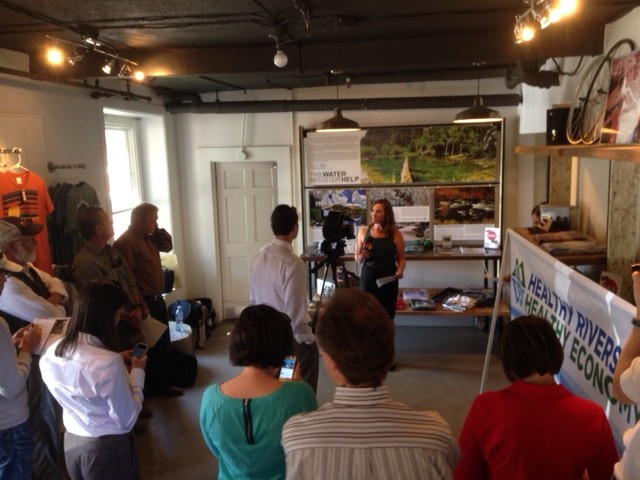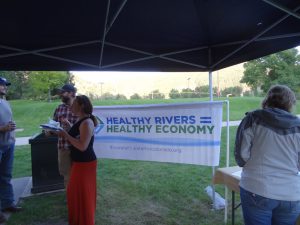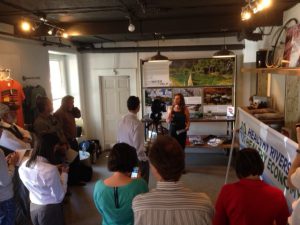
 GLENWOOD SPRINGS, Colo. — Businesses in Colorado, including boaters, rafters, anglers and other outdoor enthusiasts, were in Glenwood Springs this week to highlight the economic value of Colorado’s rivers and to ensure river flows are protected from new large trans-mountain water diversions. The river supporters shared their experiences with the Colorado Water Conservation Board (CWCB), which held a public board meeting Thursday and Friday at The Hotel Colorado.
GLENWOOD SPRINGS, Colo. — Businesses in Colorado, including boaters, rafters, anglers and other outdoor enthusiasts, were in Glenwood Springs this week to highlight the economic value of Colorado’s rivers and to ensure river flows are protected from new large trans-mountain water diversions. The river supporters shared their experiences with the Colorado Water Conservation Board (CWCB), which held a public board meeting Thursday and Friday at The Hotel Colorado.
At the executive order of Gov. John Hickenlooper, the CWCB is currently preparing the first-ever statewide water plan, which will determine how water is managed across Colorado now and for decades to come. Western Slope businesses – retailers, recreational outfitters and other outdoor-related companies – will emphasize the vast economic importance of Colorado’s river-based economy, which is greater than $9 billion annually and supports more than 80,000 jobs in the state. Water diversions, which are being debated during the CWCB board meeting, would significantly jeopardize this river economy.
 “The economic impact of commercial river rafting in Colorado last year was about $150 million, and the Colorado River-based recreation industry as a whole added $9 billion to our state’s economy. For Blue Sky Adventures, we employ 35 people, all of whom depend on healthy rivers,” said Geoff Olson, co-owner and operator of Blue Sky Adventures in Glenwood Springs. “We want the governor and the state water board to make smart, long term decisions to protect our rivers and our livelihoods, and this huge part of Colorado’s economy.”
“The economic impact of commercial river rafting in Colorado last year was about $150 million, and the Colorado River-based recreation industry as a whole added $9 billion to our state’s economy. For Blue Sky Adventures, we employ 35 people, all of whom depend on healthy rivers,” said Geoff Olson, co-owner and operator of Blue Sky Adventures in Glenwood Springs. “We want the governor and the state water board to make smart, long term decisions to protect our rivers and our livelihoods, and this huge part of Colorado’s economy.”
To protect Colorado’s $9 billion river economy, Colorado’s recreation-based leaders are encouraging the CWCB to ensure smart water management is included in the plan. In lieu of large, new trans-mountain diversions, these business want the CWCB to keep river flows at healthy levels by setting a statewide water conservation goal for the state’s cities and towns, something most other Western states have but Colorado is lacking.
“Colorado’s cities can easily conserve more water, and that will preserve flows for the river-based recreation that is so important to so many Coloradans,” said Annie Henderson, co-founder of the Upper Colorado Private Boaters Association, an American Whitewater affiliate. “If it’s going to be a Colorado water plan, it has to reflect Colorado values.”
Another way the CWCB can ensure ample water and support Colorado’s $9 billion river economy supply is by integrating the best recommendations for recreational flow, such as that proposed by the Colorado River Basin Implementation Plan, which called for a goal to protect water for recreational boating purposes.
“Our state’s recreation economy depends on healthy stream flows today,” said Nathan Fey, director of Colorado River Stewardship Program for American Whitewater. “These flows support existing businesses, jobs and local economies that rely on active outdoor recreation and tourism. Trans-mountain diversions are being proposed as a way to meet a future need – an unknown and speculative demand. The conversation about water supply at the state and local levels must be about the trade-offs between our needs today, and what our needs might be in the future.”
Adding to the direct economic boost rivers provide, Coloradans cherish their natural landscape including the rivers that provide opportunities for boating, rafting and fishing. Surveys of Colorado voters show that outdoor recreation is among the top values for residents. In addition, Front Range businesses report that outdoor recreation opportunities are key for attracting and retaining talented employees.
Make your voice heard, by taking 30 seconds to fill out this letter to the State Water Board.